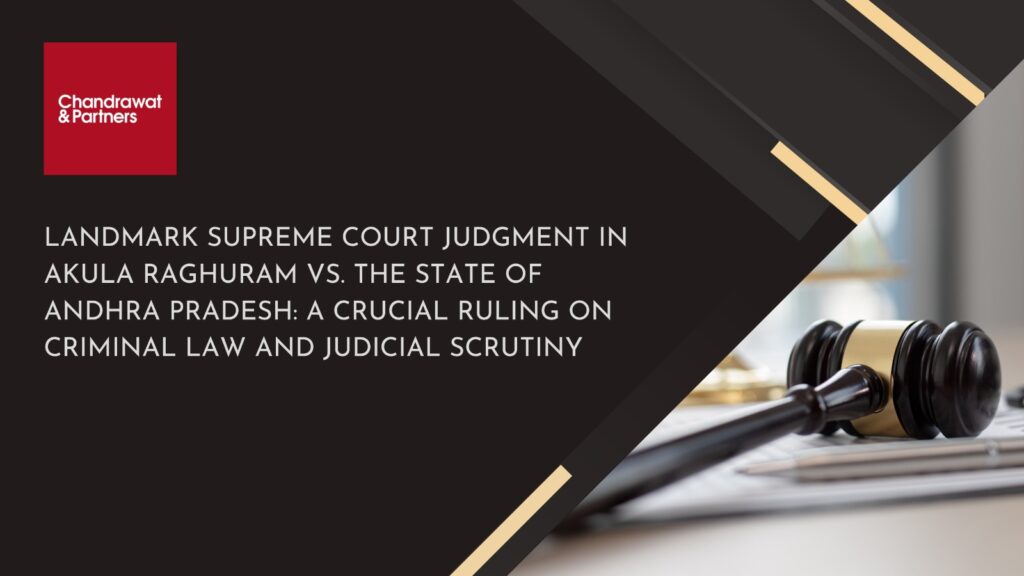Home > Recent Judgements > Landmark Supreme Court Judgment in Akula Raghuram vs. The State of Andhra Pradesh: A Crucial Ruling on Criminal Law and Judicial Scrutiny
Feb 12, 2025
Landmark Supreme Court Judgment in Akula Raghuram vs. The State of Andhra Pradesh: A Crucial Ruling on Criminal Law and Judicial Scrutiny
The Supreme Court of India delivered a noteworthy judgment in the case of Akula Raghuram vs. The State of Andhra Pradesh, providing crucial insights into the application of legal principles in criminal matters. The bench, comprising Justice B.R. Gavai, carefully examined the facts and legal arguments presented by both parties in this case. The judgment offers valuable lessons on the Court’s approach to interpreting criminal law and the application of relevant statutes in ensuring justice.
Background of the Case
The case involved Akula Raghuram, who had been convicted by the Andhra Pradesh High Court under serious criminal charges. The appellant, Akula Raghuram, had appealed against the conviction, arguing that the legal processes were not followed appropriately and that there were significant gaps in the evidence presented by the prosecution.
Key issues raised included:
- The reliability of witness testimonies.
- The adequacy of circumstantial evidence used to convict the accused.
- Whether the lower court had applied the correct legal standards when evaluating the evidence.
As the case reached the Supreme Court, it was expected to provide clarity on critical criminal law principles, including the standards of proof required for conviction and the role of judicial scrutiny in evaluating the weight of evidence in criminal cases.
The Supreme Court’s Examination
The Supreme Court, through the judgment delivered by Justice B.R. Gavai, examined several aspects related to criminal law, including:
- Evaluation of Evidence:
The bench meticulously reviewed the evidence presented in the case, particularly focusing on the circumstantial evidence and witness testimonies. The Court emphasized that in criminal matters, especially those relying heavily on circumstantial evidence, the prosecution must establish the chain of events in such a way that no other reasonable hypothesis can be drawn except the guilt of the accused.
- The Importance of Proper Legal Procedure:
The Court stressed the importance of following due process and ensuring that the rights of the accused are protected at every stage of the trial. This included scrutinizing whether the Andhra Pradesh High Court had appropriately applied the procedural rules in the original trial.
- Judicial Scrutiny of Lower Court’s Judgment:
The Supreme Court’s judgment delved deeply into the lower court’s decision-making process. The bench questioned whether the legal principles applied by the lower court were in line with established criminal jurisprudence. This included an evaluation of whether the high court’s interpretation of the law was fair and justifiable.
- Application of Criminal Law Principles:
Justice Gavai’s bench emphasized the significance of criminal law principles, including the requirement of a “beyond reasonable doubt” standard when convicting an individual. The Court reinforced that the prosecution must bear the burden of proof and the accused cannot be convicted solely on weak or ambiguous evidence.
- Rights of the Accused:
The Court highlighted the constitutional rights of the accused, reiterating that the presumption of innocence remains a cornerstone of the criminal justice system. In light of this, the Court scrutinized whether Akula Raghuram’s rights were respected throughout the legal proceedings.
Key Takeaways from the Judgment
This judgment has several important takeaways:
- Stricter Scrutiny on Circumstantial Evidence:
The Supreme Court clarified that circumstantial evidence, while important, should be scrutinized with greater caution. It emphasized that every fact in the chain of circumstances must be proved beyond a reasonable doubt, leaving no room for alternative hypotheses.
- Ensuring Fair Trials:
One of the core messages of the judgment was the need for courts to uphold fair trial standards. This includes ensuring that all legal procedures are followed, the rights of the accused are protected, and that no individual is convicted without solid, conclusive evidence.
- Role of Higher Courts in Criminal Justice:
The Supreme Court’s judgment highlighted its role as a safeguard against errors made by lower courts. It reminded the judiciary of its responsibility to not only interpret the law but also ensure that justice is done by correcting any wrongful judgments made by subordinate courts.
- Strengthening Criminal Jurisprudence:
By emphasizing proper legal procedure and the importance of reviewing evidence meticulously, the Supreme Court contributed to the strengthening of criminal jurisprudence in India. This ruling serves as an important precedent for future cases involving similar issues related to circumstantial evidence and procedural fairness.
The Supreme Court’s Verdict
While the detailed verdict is still to be fully released, legal experts anticipate that the Supreme Court may have either overturned or significantly modified the lower court’s judgment, based on its thorough evaluation of the evidence and legal arguments presented by both sides. The judgment could serve to set a stronger precedent for future criminal appeals, particularly those centered around the evaluation of evidence and the application of procedural fairness in criminal law.
Conclusion
The judgment in Akula Raghuram vs. The State of Andhra Pradesh marks a significant moment in the development of criminal law in India. The Court’s detailed analysis of evidence, procedural issues, and the rights of the accused reaffirms the importance of a fair and balanced criminal justice system. It serves as a reminder that while the pursuit of justice for victims is crucial, the rights of the accused must always be preserved, ensuring that justice is served fairly, equitably, and transparently.
For more information or queries, please email us at
enquiries@chandrawatpartners.com





